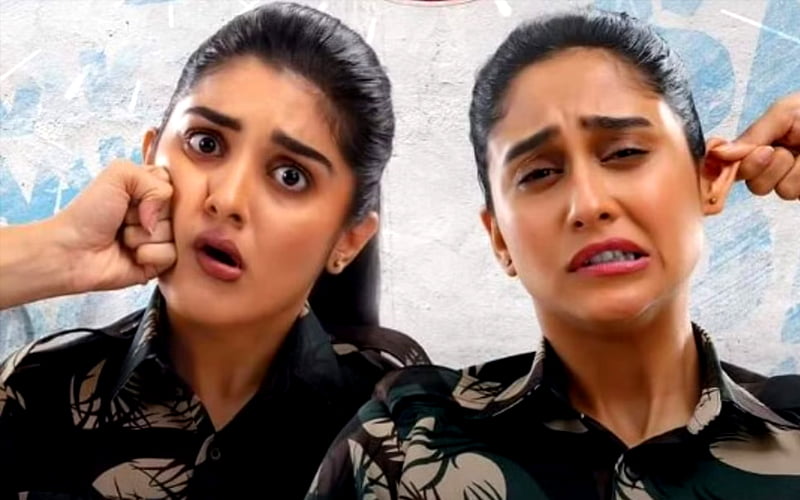Director: Sudheer Varma
Author: Akshay Poolla
Solid: Regina Cassandra, Nivetha Thomas, Johnson D M
Nested in Saakini Daakini’s second half lies one of the vital enjoyable brawls I’ve witnessed in a Telugu movie. It consists of two feminine police trainees beating up a bunch of human traffickers in a restaurant, and it’s extra plausible than most struggle scenes in “business” Indian movies involving male stars. For one, we’ve witnessed the characters practice for this. However the struggle is as gritty as it’s comedic — chairs are smashed, somebody’s beard is lit on fireplace, and noticeably, it resists the temptation most South filmmakers filming fights appear to have given into—the Snyderification of each motion scene with their alternatingly sped up and slowed down frames—carried out to extract a collection of “hero pictures” that disrupt the stream and grit of the motion. It’s a powerful piece of sequence design (the opening blows are underscored by Danny Morrison’s hyperbolic reward of a smashing Rohit Sharma innings on a TV within the background), stunt work, struggle choreography, and sound design (deliciously violent sounds of bones cracking and heads smashing towards tables). It additionally deserves to be watched within the theater, with its encompass sound and the size of the display screen. You’d be making a mistake ready for the OTT launch.
Saakini Daakini is a gender-swapped remake of the 2017 South Korean action-comedy Midnight Runners. The unique is as a lot a buddy-cop motion film as it’s a coming-of-age story of younger, confused boys turning into males. Saakini Daakini loses this particular texture, however what it replaces it with is uncommon in Telugu cinema—a feminist subtext that informs its characters’ motivations.
Think about the variations. Within the unique, jealous of a classmate’s love life, the leads take depart from the Police College to go to a high-end pub to hit on ladies. They fail miserably. They see a fairly woman strolling down the road and hope she turns to have a look at them. The woman is then kidnapped, kicking off a plot about human trafficking and the exploitation of ladies. The boys change into males once they go from seeing ladies as possessions or potential girlfriends to recognising the systemic exploitation of ladies, particularly as a result of these ladies are being lowered to their organic identities.
In Saakini Daakini, the women exit to a pub as a result of Shalini (Nivetha Thomas) hears that the actor Varun Tej frequents it and he or she desires to catch a glimpse, however they’re cautious of staying out too late as a result of they’ve a cut-off “out-time” as hostels in India typically do (and ladies’ hostels often have one which “cuts off” a few hours sooner than boys’) . When the kidnapping happens they usually inform their superior officer, they’re instructed that the very first thing they need to do is get again to the academy, “for his or her security”. Later, once they ask a cab driver to drop them in a shady a part of city, they’re instructed by him “It’s not secure for ladies”. Shalini replies “No place is secure for ladies. So what will we do? Sit at dwelling?” By the tip, the feminist undertones change into extra specific, with an digital model of “Aigiri Nandini” within the background underscoring a struggle sequence, however this nonetheless feels earned given what has led up so far.
Nivetha Thomas is nice because the boisterous Shalini, delivering on the promise she confirmed in Brochevarevarura (2019). Whereas I wasn’t satisfied by all of the traces given to her, she shows nice comedian timing in addition to a robust, visceral presence within the motion sequences. Regina Cassandra’s character may very well be barely underwritten, however she is equally convincing as an uppity economically privileged lady who finds the academy life troublesome. The humour within the first half is considerably broad-strokes and “business” in comparison with the unique, and never all of the jokes land, however the movie is creative with the localisation of the story. There’s a intelligent reference to the Bechdel check early on when our leads encounter one another in an argument. After their argument ends, a senior male officer within the academy asks considered one of them “You have been speaking about me weren’t you?” They weren’t, however such is male entitlement.
Although among the humor felt tacked on, Saakini Daakini is a intelligent, participating remake that has each the filmmaking prowess and the progressive undertones many latest smaller and medium price range Telugu movies have proven. Whereas penning this assessment, I realised I’d like a sequel. It’s the kind of “mass” movie you would like would go Pan-India regardless of its flaws.

